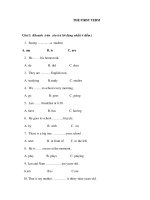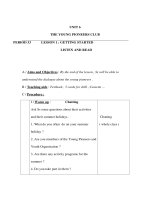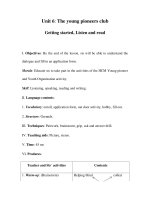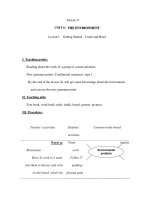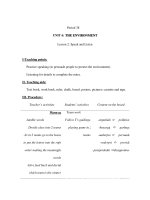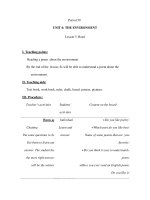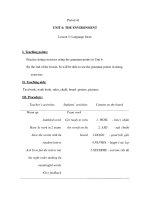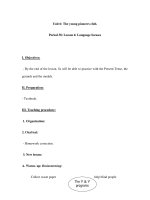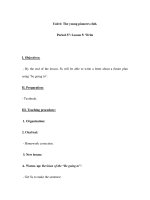WorkbookEdition 6 the magical card
Bạn đang xem bản rút gọn của tài liệu. Xem và tải ngay bản đầy đủ của tài liệu tại đây (182.19 KB, 3 trang )
READTHEORY
Passage and Questions
Name________________
Date________________
• Reading Comprehension Assessment
Directions: Read the passage. Then answer the questions below.
The Magical Card
When I was eight years old, my mother told me to put my coat on
because we were going to go someplace special. Usually, that meant we
were going to see someone important or that I would at least get a new
toy. I asked which one it would be that day, and she told me that I would
be getting something better than a toy. She said I would get “access to a
world of toys.”
I had no idea why she was being so mysterious. Similarly, I had no
real idea what she meant. “Access to a world of toys?” Did that mean we
were buying a toy store? How else would I get the opportunity to play with
so many things?
But we did not end up at any toy store. Nor did we end up seeing anyone we knew. Instead, my
mother pulled her car into a parking lot surrounding a building that looked like something out of the past. It
did not have the modern look of the rest of town. Tall trees surrounded it on all sides. And as we exited
the car, I still had no idea what this place was.
We took steep stone steps up to the entrance. Only then did I figure out what this place was,
because there was a sign that read “Marcy Public Library.” We pushed the door open, and my mother led
me to a desk in the center of the lobby.
“We’d like to get my daughter a library card,” she told the gentleman sitting behind the counter.
He asked her to fill out a form and smiled at me.
“What kind of books do you like reading?” he asked. I was shy back then and did not know how to
respond. Instead, I just smiled back and shrugged my shoulders. “Well, you’ll figure it out in time,” he told
me.
I do not remember what I checked out that first day, but I know that in the years that followed I
read everything I could find of interest at that old library. I plowed through all the Nancy Drew books
before advancing to Judy Blume, then the classics: Charles Dickens, Laura Ingalls Wilder, and Louisa
May Alcott. Then I read books on history, books of poetry, and books about art. The library opened up a
world that I never knew existed.
So my mother was right. Getting a library card was like getting access to a world of toys. With a
book in my hand, I never had trouble having fun.
1) Which of the following pairs of adjectives best describes the narrator in paragraph 2?
A.
B.
C.
D.
angry and upset
curious and confused
quiet and shy
puzzling and strange
READTHEORY
Questions
2) As used in paragraph 2, the word access most nearly means
A.
B.
C.
D.
a plan
a payment
a responsibility
an opening
3) When the narrator describes the library building as looking “like something out of the past” in
paragraph 3, she means that
A.
B.
C.
D.
the library building was old
it held many objects from the past
libraries are not common in modern times
she had never been there before
4) Which of the following authors is NOT mentioned by the narrator as someone who wrote classic
books?
A.
B.
C.
D.
Judy Blume
Charles Dickens
Laura Ingalls Wilder
Louisa May Alcott
5) Which of the following best describes the narrator’s view of the library card at the end of the
passage?
A.
B.
C.
D.
The library card taught her everything she knows.
The library card made her grow up faster.
The library card helped her outgrow toys.
The library card helped her learn to love reading.
6) At the end of the passage, the narrator says, "Getting a library card was like getting access to a world
of toys." Do you feel this is an accurate description? If so, why? If not, can you think of a better one?
_____________________________________________________________________________________________________________________________ _______________
_____________________________________________________________________________________________________________________________ _______________
__________________________________________________________________________________________________________________ __________________________
_____________________________________________________________________________________________________________________________ _______________
____________________________________________________________________________________________________________________________________________
7) Do you have a favorite author? A favorite book? Who or what is it and what makes it your favorite?
_____________________________________________________________________________________________________________________________ _______________
__________________________________________________________________________________________________________________ __________________________
_____________________________________________________________________________________________________________________________ _______________
____________________________________________________________________________________________________________________________________________
_____________________________________________________________________________________________________________________________ _______________
READTHEORY
Answers and Explanations
1) B
Question Type: Inference
In paragraph 2, the narrator still does not know where her mother is taking her. She states that she “had no idea” about why her
mother was “being so mysterious” and that she also “had no real idea what she meant.” This suggests that she is confused and
uncertain about the trip. However, she goes on to ask herself questions about the trip. This means she cares about where her
mother is taking her and is curious about it. It also means choice (B) is correct. The narrator never suggests she is angry or upset
about anything in the passage. Though she is not sure of where her mother is taking her early in the passage, she does not say that
the uncertainty makes her mad. Therefore choice (A) is incorrect. The narrator calls herself “shy back then” in paragraph 6, but the
question asks about how she is in paragraph 2, not paragraph 6. Because of this, choice (C) is incorrect. In the second paragraph,
the narrator describes her mother as acting “mysterious.” This suggests that her mother could be described as puzzling and strange,
but the question asks about the narrator, not her mother. Because of this, choice (D) is incorrect.
2) D
Question Type: Vocabulary
access (noun): an opening or means of entering someplace or using something.
In the first two paragraphs of the passage, the narrator states that her mother referred to getting a library card as gaining “access to
a world of toys.” We can use context clues—hints from known words or phrases around the unknown word or phrase—to figure out
what the word access most nearly means. The narrator wonders if this meant they were “buying a toy store,” because there is no
other way to “get the opportunity to play with so many things.” Also, in the seventh paragraph, the narrator states that “the library
opened up a world” to her. All of these suggest that access is similar to an opportunity or an opening, so choice (D) is correct.
Though the mother clearly has planned on taking her daughter to the library, the passage does not suggest that “access to a world
of toys” is similar in meaning to a “plan to a world of toys.” That would suggest that the mother had blueprints or maps of a world of
toys, which she does not. Because of this, choice (A) is incorrect. No part of the passage ever discusses money. Instead, the
narrator wonders if “access to a world of toys’ means they are “buying a toy store.” However, the passage reveals that this is not the
case. Instead, she is getting a free library card. This means that access does not actually relate to payment, so choice (B) is
incorrect. No part of the passage ever discusses responsibilities or things that the narrator or anyone else must do. This means that
access must not relate to responsibility, either, so choice (C) is incorrect.
3) A
Question Type: Inference
The narrator describes the library building as “something out of the past” before adding that “it did not have the modern look of the
rest of town.” This suggests that the building looked out of place because it looked older than the other buildings in town, likely
because it was very old. Because of this, choice (A) is correct. The narrator never describes what the library held, other than to
imply that it held many books. However, she does not describe the age of the books, so choice (B) is incorrect. Though the narrator
does say that the library building did not look like the modern buildings in the rest of town, she does not suggest that libraries in
general are uncommon. Choice (C) is incorrect because it makes too wide a statement from the limited range of the passage.
Though the narrator makes it clear she had never been to the library before her mother took her there, that fact has nothing to do
with the building looking like “something out of the past.” Neither the age of the building nor its appearance relate to her not having
been there before. So, choice (D) is incorrect.
4) A
Question Type: Detail
To answer this detail question, we need to find where in the passage the narrator describes the authors she read. A good way to do
this is to scan the topic sentence of each paragraph, since this sentence will likely tell us what information can be found in the rest of
that paragraph. The topic sentence of paragraph 7 reads: “I do not remember what I checked out that first day, but I know that in the
years that followed I read everything I could find of interest at that old library.” This lets us know that the details we are looking for
can likely be found in paragraph 7, as that paragraph is about the books the narrator read. In paragraph 7, the narrator writes that
she read “the Nancy Drew books before advancing to Judy Blume, then the classics.” This means that Judy Blume is not one of the
writers of classics, so choice (A) is correct. Charles Dickens, Laura Ingalls Wilder, and Louisa May Alcott are each listed in
paragraph 7 as “the classics” the narrator read. Because of this, choices (B), (C), and (D) are incorrect.
5) D
Question Type: Global
In the final paragraph, the narrator states that “getting a library card was like getting access to a world of toys.” She adds that, “with
a book in my hand, I never had trouble having fun.” All of this comes after the narrator has described how “the library opened up a
world” to her. Because the library card helped her to read books, and because the books caused her to have fun, it follows that the
narrator believed the library card helped her learn to love reading. Choice (D) is correct as a result. Though the narrator does state
the library card “opened up a world that [she] never knew existed,” she does not suggest that the library card helped her learn
everything she knows. That is too broad of a statement, so choice (A) is incorrect. The narrator does suggest that she grew up with
the library card, but it does not suggest that access to library books made her grow up faster than she otherwise would have.
Because of this, choice (B) is incorrect. Though the narrator suggests that getting a library card was better than getting a single toy,
she does not suggest that the library card caused her to outgrow toys. The passage does not state that she never played with a toy
after getting the library card, for instance. Because of this, choice (C) is incorrect.
